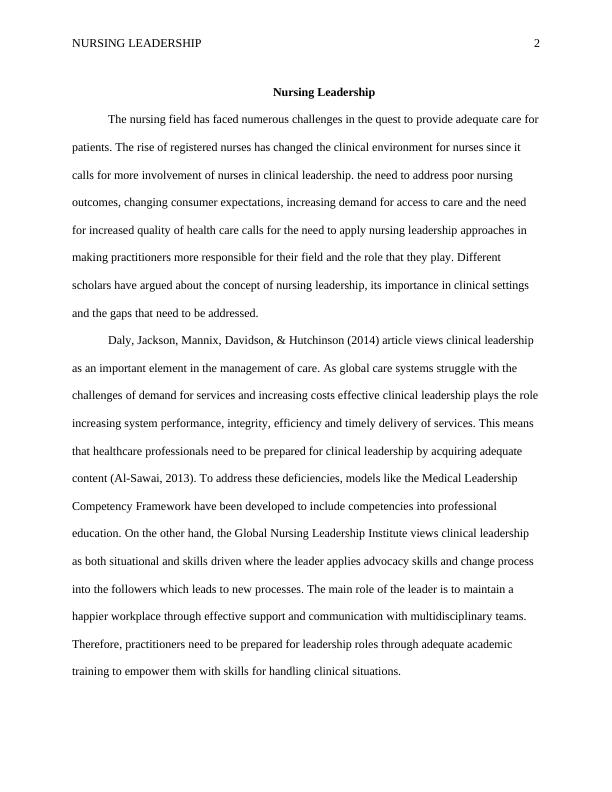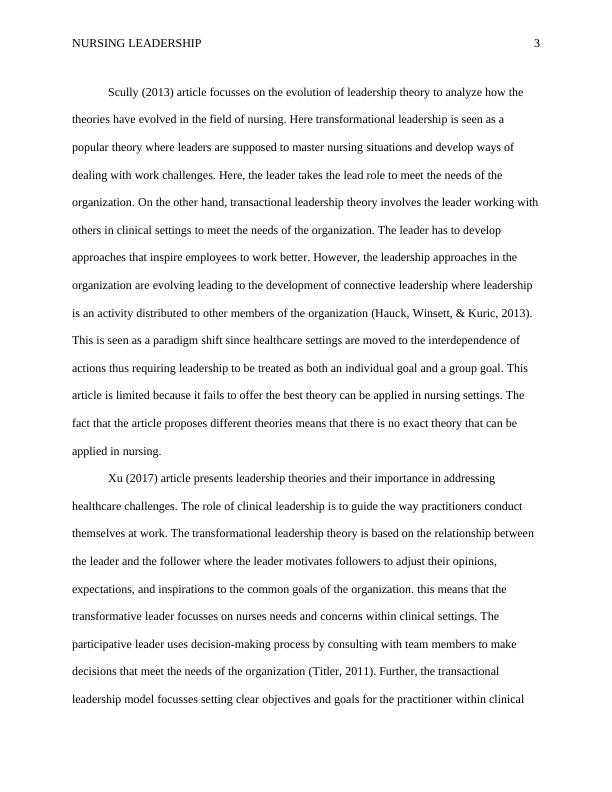Nursing Leadership: Importance, Theories, and Recommendations
Added on 2023-06-03
8 Pages1757 Words491 Views
Running head: NURSING LEADERSHIP 1
Nursing Leadership
Student’s Name
University
Nursing Leadership
Student’s Name
University

NURSING LEADERSHIP 2
Nursing Leadership
The nursing field has faced numerous challenges in the quest to provide adequate care for
patients. The rise of registered nurses has changed the clinical environment for nurses since it
calls for more involvement of nurses in clinical leadership. the need to address poor nursing
outcomes, changing consumer expectations, increasing demand for access to care and the need
for increased quality of health care calls for the need to apply nursing leadership approaches in
making practitioners more responsible for their field and the role that they play. Different
scholars have argued about the concept of nursing leadership, its importance in clinical settings
and the gaps that need to be addressed.
Daly, Jackson, Mannix, Davidson, & Hutchinson (2014) article views clinical leadership
as an important element in the management of care. As global care systems struggle with the
challenges of demand for services and increasing costs effective clinical leadership plays the role
increasing system performance, integrity, efficiency and timely delivery of services. This means
that healthcare professionals need to be prepared for clinical leadership by acquiring adequate
content (Al-Sawai, 2013). To address these deficiencies, models like the Medical Leadership
Competency Framework have been developed to include competencies into professional
education. On the other hand, the Global Nursing Leadership Institute views clinical leadership
as both situational and skills driven where the leader applies advocacy skills and change process
into the followers which leads to new processes. The main role of the leader is to maintain a
happier workplace through effective support and communication with multidisciplinary teams.
Therefore, practitioners need to be prepared for leadership roles through adequate academic
training to empower them with skills for handling clinical situations.
Nursing Leadership
The nursing field has faced numerous challenges in the quest to provide adequate care for
patients. The rise of registered nurses has changed the clinical environment for nurses since it
calls for more involvement of nurses in clinical leadership. the need to address poor nursing
outcomes, changing consumer expectations, increasing demand for access to care and the need
for increased quality of health care calls for the need to apply nursing leadership approaches in
making practitioners more responsible for their field and the role that they play. Different
scholars have argued about the concept of nursing leadership, its importance in clinical settings
and the gaps that need to be addressed.
Daly, Jackson, Mannix, Davidson, & Hutchinson (2014) article views clinical leadership
as an important element in the management of care. As global care systems struggle with the
challenges of demand for services and increasing costs effective clinical leadership plays the role
increasing system performance, integrity, efficiency and timely delivery of services. This means
that healthcare professionals need to be prepared for clinical leadership by acquiring adequate
content (Al-Sawai, 2013). To address these deficiencies, models like the Medical Leadership
Competency Framework have been developed to include competencies into professional
education. On the other hand, the Global Nursing Leadership Institute views clinical leadership
as both situational and skills driven where the leader applies advocacy skills and change process
into the followers which leads to new processes. The main role of the leader is to maintain a
happier workplace through effective support and communication with multidisciplinary teams.
Therefore, practitioners need to be prepared for leadership roles through adequate academic
training to empower them with skills for handling clinical situations.

NURSING LEADERSHIP 3
Scully (2013) article focusses on the evolution of leadership theory to analyze how the
theories have evolved in the field of nursing. Here transformational leadership is seen as a
popular theory where leaders are supposed to master nursing situations and develop ways of
dealing with work challenges. Here, the leader takes the lead role to meet the needs of the
organization. On the other hand, transactional leadership theory involves the leader working with
others in clinical settings to meet the needs of the organization. The leader has to develop
approaches that inspire employees to work better. However, the leadership approaches in the
organization are evolving leading to the development of connective leadership where leadership
is an activity distributed to other members of the organization (Hauck, Winsett, & Kuric, 2013).
This is seen as a paradigm shift since healthcare settings are moved to the interdependence of
actions thus requiring leadership to be treated as both an individual goal and a group goal. This
article is limited because it fails to offer the best theory can be applied in nursing settings. The
fact that the article proposes different theories means that there is no exact theory that can be
applied in nursing.
Xu (2017) article presents leadership theories and their importance in addressing
healthcare challenges. The role of clinical leadership is to guide the way practitioners conduct
themselves at work. The transformational leadership theory is based on the relationship between
the leader and the follower where the leader motivates followers to adjust their opinions,
expectations, and inspirations to the common goals of the organization. this means that the
transformative leader focusses on nurses needs and concerns within clinical settings. The
participative leader uses decision-making process by consulting with team members to make
decisions that meet the needs of the organization (Titler, 2011). Further, the transactional
leadership model focusses setting clear objectives and goals for the practitioner within clinical
Scully (2013) article focusses on the evolution of leadership theory to analyze how the
theories have evolved in the field of nursing. Here transformational leadership is seen as a
popular theory where leaders are supposed to master nursing situations and develop ways of
dealing with work challenges. Here, the leader takes the lead role to meet the needs of the
organization. On the other hand, transactional leadership theory involves the leader working with
others in clinical settings to meet the needs of the organization. The leader has to develop
approaches that inspire employees to work better. However, the leadership approaches in the
organization are evolving leading to the development of connective leadership where leadership
is an activity distributed to other members of the organization (Hauck, Winsett, & Kuric, 2013).
This is seen as a paradigm shift since healthcare settings are moved to the interdependence of
actions thus requiring leadership to be treated as both an individual goal and a group goal. This
article is limited because it fails to offer the best theory can be applied in nursing settings. The
fact that the article proposes different theories means that there is no exact theory that can be
applied in nursing.
Xu (2017) article presents leadership theories and their importance in addressing
healthcare challenges. The role of clinical leadership is to guide the way practitioners conduct
themselves at work. The transformational leadership theory is based on the relationship between
the leader and the follower where the leader motivates followers to adjust their opinions,
expectations, and inspirations to the common goals of the organization. this means that the
transformative leader focusses on nurses needs and concerns within clinical settings. The
participative leader uses decision-making process by consulting with team members to make
decisions that meet the needs of the organization (Titler, 2011). Further, the transactional
leadership model focusses setting clear objectives and goals for the practitioner within clinical

End of preview
Want to access all the pages? Upload your documents or become a member.
Related Documents
Leadership in Clinical Practice: Importance, Theories, and Challengeslg...
|12
|2641
|314
Leadership Potential in Nursing | SMART Goalslg...
|8
|1945
|36
Clinical Leadership and Nursing: A Literature Reviewlg...
|8
|2043
|306
The Assignment on Nursing Leadership in Clinical Practicelg...
|14
|1021
|7
Clinical Leadership Articlelg...
|11
|2158
|192
Efficiency in Clinical Settingslg...
|9
|2572
|13
